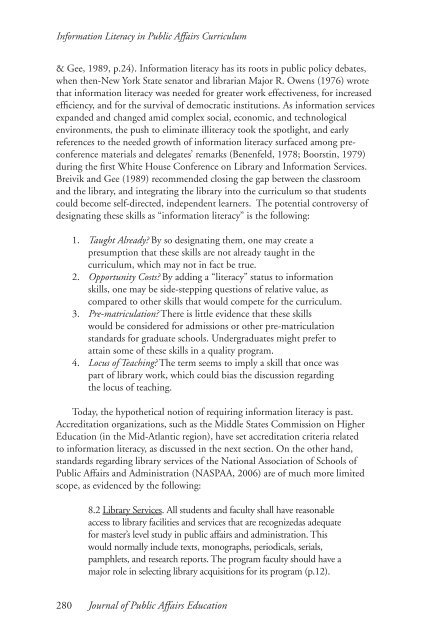JOURNAL OF PUBLIC AFFAIRS EDUCATION - Naspaa
JOURNAL OF PUBLIC AFFAIRS EDUCATION - Naspaa
JOURNAL OF PUBLIC AFFAIRS EDUCATION - Naspaa
Create successful ePaper yourself
Turn your PDF publications into a flip-book with our unique Google optimized e-Paper software.
Information Literacy in Public Affairs Curriculum& Gee, 1989, p.24). Information literacy has its roots in public policy debates,when then-New York State senator and librarian Major R. Owens (1976) wrotethat information literacy was needed for greater work effectiveness, for increasedefficiency, and for the survival of democratic institutions. As information servicesexpanded and changed amid complex social, economic, and technologicalenvironments, the push to eliminate illiteracy took the spotlight, and earlyreferences to the needed growth of information literacy surfaced among preconferencematerials and delegates’ remarks (Benenfeld, 1978; Boorstin, 1979)during the first White House Conference on Library and Information Services.Breivik and Gee (1989) recommended closing the gap between the classroomand the library, and integrating the library into the curriculum so that studentscould become self-directed, independent learners. The potential controversy ofdesignating these skills as “information literacy” is the following:1. Taught Already? By so designating them, one may create apresumption that these skills are not already taught in thecurriculum, which may not in fact be true.2. Opportunity Costs? By adding a “literacy” status to informationskills, one may be side-stepping questions of relative value, ascompared to other skills that would compete for the curriculum.3. Pre-matriculation? There is little evidence that these skillswould be considered for admissions or other pre-matriculationstandards for graduate schools. Undergraduates might prefer toattain some of these skills in a quality program.4. Locus of Teaching? The term seems to imply a skill that once waspart of library work, which could bias the discussion regardingthe locus of teaching.Today, the hypothetical notion of requiring information literacy is past.Accreditation organizations, such as the Middle States Commission on HigherEducation (in the Mid-Atlantic region), have set accreditation criteria relatedto information literacy, as discussed in the next section. On the other hand,standards regarding library services of the National Association of Schools ofPublic Affairs and Administration (NASPAA, 2006) are of much more limitedscope, as evidenced by the following:8.2 Library Services. All students and faculty shall have reasonableaccess to library facilities and services that are recognizedas adequatefor master’s level study in public affairs and administration. Thiswould normally include texts, monographs, periodicals, serials,pamphlets, and research reports. The program faculty should have amajor role in selecting library acquisitions for its program (p.12).280 Journal of Public Affairs Education
















